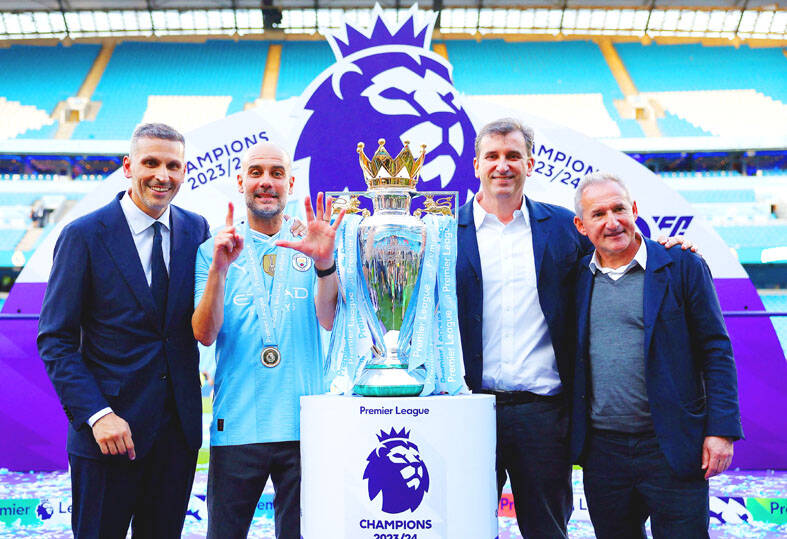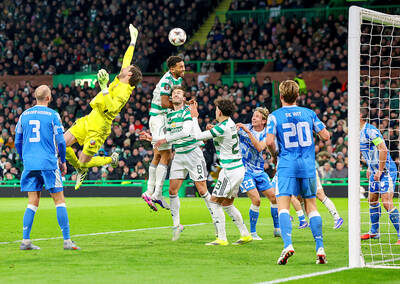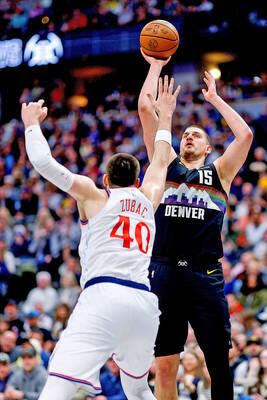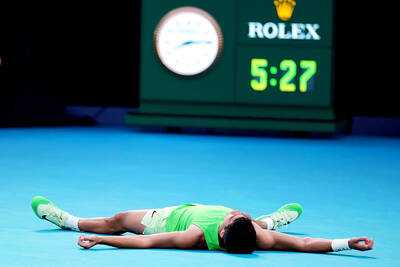Perhaps the most revealing aspect of the interview Manchester City manager Pep Guardiola gave to British GQ last week was how tired he sounded. The headlines that he was contemplating a 15-year break from the game did not entirely reflect what he said — “I don’t know how long I’ll stop for: a year, two years, three years, five, 10, 15, I don’t know, but I will leave after this spell with City because I need to stop and focus on myself, on my body” — but his weariness was clear.
To an extent, it is not a surprise. Juergen Klopp was exhausted (and self-aware) enough after almost 15 seasons at Dortmund and Liverpool (plus seven at Mainz) to quit last summer. There were times last season, particularly in that four-month spell either side of Christmas, when City’s form dipped alarmingly, that Guardiola seemed shattered.
By his own admission, his decision in November last year to sign a contract extension to summer 2027 was motivated in part by guilt at the downturn.

Photo: Reuters
“The problems we had in the last month, I felt now was not the right time to leave,” he said. The problems got much worse.
To which there can be two reactions. On the one hand, it is rare and admirable that a manager should feel such a sense of responsibility to his club. While many are sacked before they have a chance to resolve problems, there are also plenty happy enough to walk away with a payoff and pass the crisis on to somebody else.
On the other hand, it probably is not a great sign if a manager with two years left on his contract is already looking forward to the extended holiday he is going to have when it is all over
However, management is exhausting. It was striking in the interview that the element Guardiola picked out as most debilitating was having opposing fans chanting he was going to be sacked in the morning, the sort of mundane banter that it is easy to assume just washes off managers as experienced and successful as Guardiola.
Beyond that, it is useful to be reminded just how tough a job management is, and it might be getting even tougher.
Over the course of his two autobiographies, it becomes clear how relentless Brian Clough found the grind of management: There was no time to enjoy a victory on Saturday, he said, before he was having to start thinking about the game on Wednesday.
That was before the calendar was as packed as it is now, and Clough was somebody quite happy to pop over to Mallorca, Spain, for a holiday during the season, somebody who was known even at the time for the infrequency of his appearances on the training pitch.
Managers today have far more help than they used to. They have specialist coaches and analysts, and their job, at least at the top level, is focused largely on preparing the team. With one or two exceptions, transfers and long-term strategy are the responsibility of a sporting director.
Still, it is an often thankless role where successes are quickly forgotten and a few bad weeks can lead to the sack.
Guardiola has spoken with a degree of enthusiasm about the challenge of rebuilding City. Given that he has a naturally sarcastic tone, it is never entirely easy to tell, but that can probably be taken at face value.
One of the problems for a manager who has been in a job for an extended time, particularly when they have been as successful as Guardiola, is finding new challenges. Building a team to win the league is invigorating, stimulating, exciting, setting it going again to win again is less so.
The comedian Stewart Lee wrote in his autobiography about how, on long tours he would deliberately lose part of his audience because of the kick he got from winning it back; it is not to suggest Guardiola would have chosen to be in this position to say he might relish the challenge of restoring City to the title.
There is another factor, which is that very few managers remain at the highest level for much more than a decade. Alex Ferguson is an obvious counter-example, with 20 years separating his first title at Manchester United from his last, but he is an outlier who skews expectations.
Former Italy, AC Milan and Atletico Madrid manager Arrigo Sacchi’s peak lasted about four years. Even Jose Mourinho was probably already past his best when he won his last league title, at Chelsea in 2014-15, 12 years after his first, at Porto.
Every game Guardiola has taken charge of since he was appointed at Barcelona in 2008 has been dissected. For 17 years — less his year off in New York — opponents have been looking for ways to stymy his attacking plans and defensive vulnerabilities. Match footage has been pored over, data crunched. Part of Guardiola’s genius has been to keep evolving, to remain ahead of his pursuers.
That has always happened, but never to the same extent as today. Teams have never been worked out so quickly; what might have taken a season 50 years ago now happens in a couple of weeks. To stay ahead is to adapt constantly, and that is exhausting.
There comes a point when the energy almost visibly leaves a manager, as it did with Mourinho and Arsene Wenger. Unable to stay in front of the pack any longer, they lapse into self-parody.
Guardiola is not there yet. Managerial arcs rarely end in a cliff-edge; it is not that they are suddenly finished, but no career can go on forever upward.
After 17 years at the top, as he begins to feel the toll, it might be that the descent has begun. Which might still be enough to win City another league title, but nothing lasts forever.

Nottingham Forest FC are to go into the Europa League play-off round after a 4-0 win over Ferencvaros TC on Thursday, while Celtic FC secured their place in the knockout phase with a victory over FC Utrecht. Aston Villa FC finished second in the league phase after recovering from two goals down to beat FC Red Bull Salzburg 3-2 with their spot in the last 16 already assured. Forest stood an outside chance of climbing into the top eight going into the final round of matches, but needed to beat Robbie Keane’s Ferencvaros and rely on other results going their way. Sean Dyche’s

HEATED RIVALRY: The pair had met 14 times previously, with Sabalenka winning eight of the encounters and entering the final as the favorite to take the title Elena Rybakina took revenge over world No. 1 Aryna Sabalenka to win a nail-biting Australian Open final yesterday and clinch her second Grand Slam title. The big-serving Kazakh fifth seed held her nerve to pull through 6-4, 4-6, 6-4 at Rod Laver Arena in Melbourne in 2 hours, 18 minutes. It was payback after the Belarusian Sabalenka won the 2023 final between two of the hardest hitters in women’s tennis. The ice-cool Rybakina, 26, who was born in Moscow, adds her Melbourne triumph to her Wimbledon win in 2022. It was more disappointment in a major final for Sabalenka, who won the US Open

Denver superstar Nikola Jokic returned from a 16-game injury absence to post a 31-point, 12-rebound double-double on Friday and propel the Nuggets to a 122-109 NBA victory over the Los Angeles Clippers. Three-time NBA Most Valuable Player Jokic had not played since suffering a bone bruise in the left knee he hyperextended in a game against Miami on Dec. 29 last year. The Serbian big man did not miss a beat. He led all scorers, connecting on eight of 11 shots from the field, and also handed out five assists with three steals while playing just 24 minutes, 32 seconds as the

BATTERED AND BRUISED: Alcaraz suffered a cramp in the third set, but was allowed treatment despite Zverev’s protests, and continued on to win in five-and-a-half hours An ailing Carlos Alcaraz battled past Alexander Zverev yesterday in five epic sets to reach his first Australian Open final and move within a match of becoming the youngest man to complete a career Grand Slam. The world No. 1 outlasted the German third seed 6-4, 7-6 (7/5), 6-7 (3/7), 6-7 (4/7), 7-5 over a titanic 5 hours, 27 minutes in hot conditions to head to tomorrow’s title match. He only narrowly avoided crashing out after a huge fright at 4-4 in the third set when he pulled up in pain with what appeared to be cramp. He was allowed to have treatment